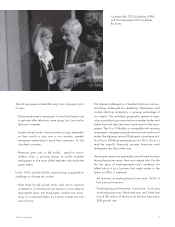Washington Post 2006 Annual Report Download - page 21
Download and view the complete annual report
Please find page 21 of the 2006 Washington Post annual report below. You can navigate through the pages in the report by either clicking on the pages listed below, or by using the keyword search tool below to find specific information within the annual report.If the Department of Education were to find that one reporting unit in Kaplan's Higher Education Division had failed to
comply with any applicable Title IV requirement and as a result limited, suspended or terminated the Title IV eligibility of the
school or schools in that reporting unit, that action normally would not affect the Title IV eligibility of the schools in other
reporting units that had continued to comply with Title IV requirements. The largest Title IV reporting unit in the Higher
Education Division in terms of revenue is Kaplan University, which accounted for approximately 33% of the Title IV funds
received by the Division in 2006. For the most recent year for which data are available from the Department of Education,
the cohort default rate for the Title IV reporting units in Kaplan's Higher Education Division averaged 10.5%, and no
reporting unit had a cohort default rate of 25% or more. In 2006 those reporting units derived an average of less than
81% of their receipts from Title IV programs, with no unit deriving more than 88% of its receipts from such programs.
No proceeding by the Department of Education is currently pending to fine any Kaplan school for a failure to comply with
any Title IV requirement, or to limit, suspend or terminate the Title IV eligibility of any Kaplan school. As noted previously, to
remain eligible to participate in Title IV programs a school must maintain its accreditation by an accrediting agency
recognized by the Department of Education. In December 2006 four schools in one Title IV reporting unit received notice
that their accreditor did not intend to renew the schools' accreditation due to the failure to meet certain completion and
placement requirements. The schools have appealed that determination and expect a decision on the appeal in April
2007. In addition, another Kaplan school has an unresolved show cause order issued against it by its accrediting agency.
Such orders are issued when an accrediting agency is concerned that an institution may be out of compliance with one or
more applicable accrediting standards, and gives the institution an opportunity to respond before any further action is
taken. The institution may be able to demonstrate that the concern is unfounded, that the necessary corrective action has
already been taken or that it has implemented an ongoing program that will resolve the concern. The agency may then
vacate the order or continue the order pending the receipt of additional information or the achievement of specified
objectives. If the agency's concerns are not resolved to its satisfaction, it may then withdraw the institution's accreditation.
The aforementioned schools collectively accounted for approximately 3.5% of the Title IV funds received in 2006 by the
schools in Kaplan's Higher Education Division and on a combined basis incurred on operating loss in that year.
No assurance can be given that the Kaplan schools currently participating in Title IV programs will maintain their Title IV
eligibility in the future or that the Department of Education might not successfully assert that one or more of such schools
have previously failed to comply with Title IV requirements.
All of the Title IV financial aid programs are subject to periodic legislative review and reauthorization. In addition, while
Congress historically has not limited the amount of funding available for the various Title IV student loan programs, the
availability of funding for the Title IV programs that provide for the payment of grants is wholly contingent upon the outcome
of the annual federal appropriations process.
Whether as a result of changes in the laws and regulations governing Title IV programs, a reduction in Title IV program
funding levels or a failure of schools included in Kaplan's Higher Education Division to maintain eligibility to participate in
Title IV programs, a material reduction in the amount of Title IV financial assistance available to the students of those schools
would have a significant negative impact on Kaplan's operating results. In addition, any development that has the effect of
making the terms on which Title IV financial assistance is made available materially less attractive could also adversely
effect Kaplan's operating results.
Newspaper Publishing
The Washington Post
WP Company LLC (""WP Company''), a subsidiary of the Company, publishes
The Washington Post,
which is a morning
daily and Sunday newspaper primarily distributed by home delivery in the Washington, D.C. metropolitan area, including
large portions of Maryland and northern Virginia.
The following table shows the average paid daily (including Saturday) and Sunday circulation of
The Post
for the
12-month periods ended September 30 in each of the last five years, as reported by the Audit Bureau of Circulations
(""ABC'') for the years 2002Ó2005 and as estimated by
The Post
for the 12-month period ended October 1, 2006
2006 FORM 10-K 5
























